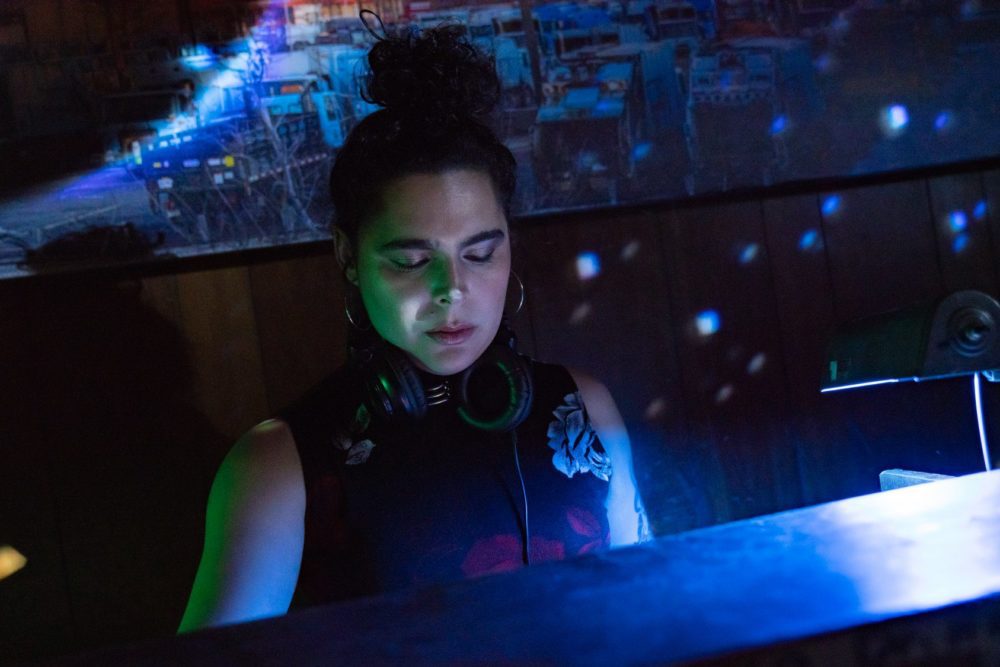

Can techno music be a site for climate activism? That was the big question posed by a virtual panel held on Friday, May 22, where Chicago DJs Ariel Zetina and Club Chow (Kevin Chow) as well as British musician and activist Kimwei McCarthy were happy to weigh in. The discussion was organized by Grant Tyler, a student at the School of the Art Institute of Chicago (SAIC), and Mika Tosca, a climate scientist and assistant professor at SAIC.
Full disclosure: I’m an SAIC alum and occasional freelancer for their marketing department. But I’m intrigued by music’s potential and limitations for activating political imagination, and what can I say? This was the most interesting Zoom event I attended last week – and trust me, I went to many. Who’s that culture writer sneaking in to take the temperature of your e-parties and never turning on their camera? It’s me, guys. It’s me.
I know what you’re thinking: Techno’s place in climate action is a pretty big question for one panel. But Chicago seems a natural place to ask. This city has given so much to electronic music, benefiting from its proximity to Detroit techno and pioneering acid house. Hell, we gave you Wax Trax! Afrofuturism is also threaded into the fabric of Black Chicago culture, most audibly in the work of jazz musician Sun Ra, who used science fiction’s escapism and technological critiques to create speculative audio worlds.
Plus, music history is always political history. Techno is no exception. During the talk, Zetina mentioned higher profile techno artists whose work has intersected with social justice politics and especially environmental organizing. Of particular note was the EP Acid Rain by the group Underground Resistance, who were ideologically influenced by the Black Panthers and whose music developed partially as a response to the environmental and economic reality of Black Detroiters in the late ’80s. By Underground Resistance’s own words, techno is “the music for the future of the human race.” Without it: no peace, no love, no vision. But shared modes of expression don’t always point to a shared politics.
“I think there’s a tendency within techno to superimpose a … Utopian discourse,” Chow pointed out, “and [impose an idea of] radical political action on top of raves. But I would argue, most of time, none of that is actually happening.” Got me there, Chow. Happens all the time in punk, too. While he casually noted there are collectives that do meaningful work — mutual aid, building community, and so on — the music is largely apolitical. In his estimate, creating significant change through techno would require a big cultural shift — one that begins with open, frank discussions about who is participating and how, and applying pressure on show promoters to change priorities.
One point the discussion kept circling back to was how well DJ sets have adapted to the constraints of COVID-19. Since they rely on individuals over groups and often incorporate technology-based audio-visual elements, club grooves are thriving (clubs, on the other hand…). Zetina emphasized her work has her flying often, that high-ranking DJs fly in private jets even more, and that there’s a global techno/rave culture that encourages bouncing between countries for events. While not a uniquely carbon intensive culture, high carbon emissions seem part of techno’s modern DNA. Does coronavirus present an opportunity to reimagine the rave as a carbon-neutral space?
Tyler said celebrating DJs successfully connecting with audiences during quarantine ignores why people go to raves: to physically connect with one another. McCarthy responded, “Not to say that we should completely replace live music with virtual reality, but if there’s a genre that could push forward virtual reality concerts, I would imagine it to be techno.” It’s a prescient insight. Creative work rooted in digital technology has long presented world-building opportunities. Alternate realities can be escapes, but they can also pose questions about the worlds we’re trying to escape from and even offer new visions for those worlds.
Zetina used the chat to link an article about Finland holding a virtual concert to celebrate May Day. Seven-hundred thousand people tuned in, and of them, 150,000 created avatars to move through and interact with the concert space. While not techno specific, it certainly sets a precedence for audiences’ willingness to adapt to changing circumstances. And it’s not inappropriate to treat global warming with the same urgency as COVID-19.
As a researcher noted during a recent panel discussion on COVID-19 and climate change at UC-Berkley, “The public health and climate debates are inextricably linked. In our highly connected world, a disease that originated 3,000 or 6,000 miles away can be at our doorsteps in a day or less. So, the way that we mobilize against COVID-19 needs to be reflected in the way that we mobilize against that other big global affliction called climate change.”
Spoiler: the techno panel did not reach a tidy conclusion about what techno should do about climate change. In fact, it maybe posed more questions than it answered. But one sign of a fruitful discussion is identifying some key stakes and possibilities, no? It definitely did — and offered a sick playlist to boot.
If you’re interested to learn more, the hour-and-a-half discussion (and subsequent one hour DJ sets from Zetina and Chow) are available on YouTube.




